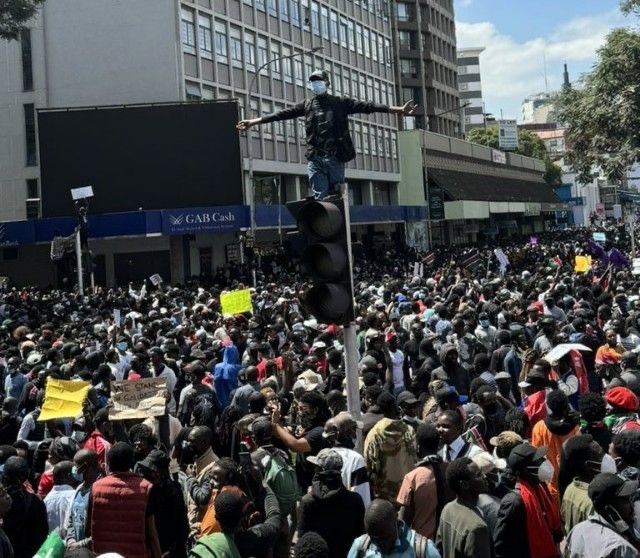KENYA PROTEST INSPIRES YOUNG NIGERIANS

A wave of protests is sweeping through Kenya. Triggered by controversial proposed tax hikes, the movement has evolved into a wider campaign for more accountable governance in the country. Some demand the entire government’s resignation. The demonstrations started on 18 June, and for a week were overwhelmingly peaceful, but in the early afternoon of 25 June, they took a violent turn.
A number of demonstrators breached police barricades and stormed the precincts of parliament. They set parts of the building on fire, destroyed legislators’ offices and carted away property, including the speaker’s mace. Kenyan police, who have a well-deserved reputation for brutality, and have in recent days drawn strong criticism for repeatedly lobbing tear gas at protesters and charging them with batons, responded with live fire. On 26 June, the Kenya National Commission on Human Rights reported that 39 people had been killed in the protests since they began.
The uproar stemming from these events has resonated far beyond Kenya’s borders, particularly among the youth in Nigeria. Nigerian Gen Z, known for their digital savvy and activism, have closely followed the developments, drawing inspiration from their Kenyan counterparts’ bravery and resolve.
The Kenyan protests highlight several critical issues: economic disenfranchisement, government accountability, and police brutality—all issues that also resonate deeply with young Nigerians. The proposed tax hikes in the East African country were seen as the final straw in a series of government policies that disproportionately affected the youth and the economically vulnerable. Similarly, in Nigeria, young people have long felt the brunt of economic mismanagement, high unemployment rates, and inadequate social services.
In Kenya, the protest movement has been predominantly driven by young people, particularly those in the Gen Z demographic. This generation has grown up in a digital age, where information flows freely and rapidly across borders. Social media platforms like Twitter, Instagram, and TikTok have played a crucial role in mobilizing the youth, sharing real-time updates, and galvanizing support for the cause. The same tools that fueled the End SARS protests in Nigeria in 2020 are now being used by Kenyan youth to challenge their government.
The protests’ escalation on 25 June, when demonstrators breached police barricades and stormed parliament, was a pivotal moment. This act of defiance against an institution symbolizing governmental power and authority sent a powerful message: the youth are no longer willing to accept the status quo. The violent response from the police, resulting in 39 deaths, further underscored the deep-seated issues of state violence and human rights abuses, drawing international condemnation and support.
For young Nigerians, the Kenyan protests serve as a stark reminder of their own struggles and the potential for change through collective action. The End SARS movement, which also saw significant participation from Gen Z, brought global attention to police brutality in Nigeria and led to some reforms, though many argue that much work remains to be done. The parallels between the two movements are striking, with both highlighting the critical role of youth in demanding accountability and justice.
The impact of the Kenyan protests on Nigerian youth can be seen in the increased online discourse about governance and activism. Hashtags like #KenyaProtests and #StandWithKenya have trended on Nigerian Twitter, with many young Nigerians expressing solidarity and calling for similar actions to address their grievances. The Kenyan protests have reignited discussions about the power of the youth and the need for sustained pressure on the government to enact meaningful change.
One of the most significant outcomes of these protests is the renewed sense of empowerment among Nigerian youth. Seeing their peers in the Ruto led nation take to the streets and demand their rights has bolstered their resolve to fight for their own. The narrative that young people are apathetic or disengaged is being challenged, as Gen Z in Nigeria increasingly recognizes their power to influence and drive social change.
The lessons from this country are manifold. First, the importance of unity and organisation in protest movements cannot be overstated. The Kenyan protesters’ ability to mobilize quickly and effectively, using both traditional and digital means, serves as a blueprint for Nigerian youth. Second, the role of social media as a tool for advocacy and awareness continues to be crucial. Platforms that connect people across the globe enable young activists to share strategies, amplify their voices, and garner international support.
However, the Kenyan protests also serve as a cautionary tale about the potential for violence and state repression. The tragic loss of life underscores the risks involved in confronting entrenched power structures. Nigerian youth must navigate these challenges carefully, balancing the need for assertive action with strategies to minimize harm and build broader coalitions of support.
In conclusion, the Kenyan protests have inspired a new wave of activism among Nigerian youth. As Gen Z in Nigeria continues to push for change, the lessons from Kenya offer both inspiration and caution, reminding us that the fight for justice and accountability is ongoing and requires courage, resilience, and solidarity. The future of Nigeria, much like that of Kenya, lies in the hands of its youth, whose voices and actions will shape the path forward.





